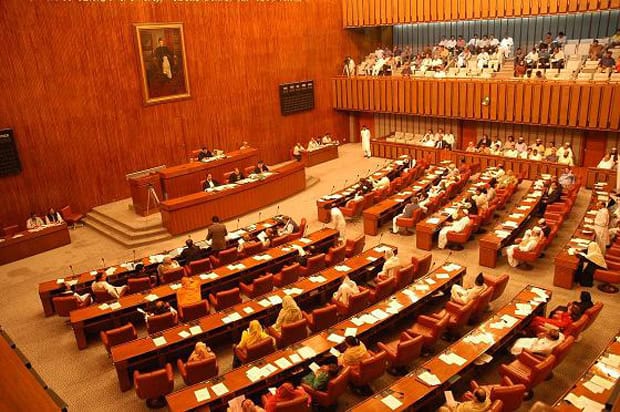ISLAMABAD – The upper house of the parliament amended the Pakistan Air Force Act, 1953, on Monday empowering the Air Force to reopen cases against its retired officers with retrospective effect.
The amendment bill that was moved by Law Minister Zahid Hamid on behalf of the defence minister was passed with a majority vote of 18:14 as the government and the Pakistan Tehreek-i-Insaf gave the go ahead. The Pakistan Peoples Party and Awami National Party voted against the bill while senators from Fata refrained from voting.
Fearing that the backdated legislation might target some former PAF officers, Farhatullah Babar of the PPP asked the government to explain the rationale behind the move.
“No one was against trial of corrupt retired PAF officers under the Air Force Act, but it was well known that the Army and Navy tried retired officers under their respective laws and did not send their cases to NAB or any other civilian agency,” said Babar.
“If the PAF also wished to do the same there was no quarrel but for God’s sake do so from today and not retrospectively,” he added.
Senator Babar vehemently opposed the amendment and had submitted a dissenting note when the draft Pakistan Air Force Act, 1953, was approved by the defence committee of the Senate a few weeks ago.
The legislation would surely make alleged corrupt officials of Pakistan Air force face the music in the upcoming days as a case related to to the alleged embezzlement of Rs6.4 million at the Nur Khan Airbase, Chaklala still needs a review.
A petition was also filed in the Islamabad high court in this regard in which it was argued that the the Pakistan Air Force (PAF) authorities made two airmen a ‘scapegoat’ to exonerate senior officers in a Rs 6.4 million fraud case.
Apart from green lighting the PAF amendment bill, another much-awaited piece of proposed legislation intended to give the fundamental right to the citizens to have access to all information held by public bodies was also tabled in the Senate on Monday.
The bill titled ‘Right of access to information’ introduced in the house by Minister of State for Information Marriyum Aurangzeb will compel all public bodies of the federal government to respond to all citizens seeking information within a span of 10 working days.
The period may be extended by maximum of another 10 working days provided the request requires a search through a large number of records located at different locations or in case any consultation is required with other parties involved.
The information provided under the law will be accompanied by a certificate that the information is correct and will be dated and signed by a designated official. However, the information may not be revealed if its disclosure is likely to result in commission of an offence, harm the detection, prevention, investigation or inquiry in a particular case, reveal the identity of a confidential source of information or facilitate escape from legal custody, Dawn news reported.














